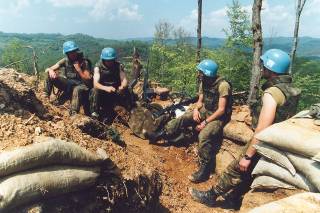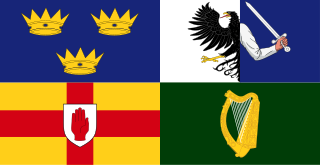
Naser Orić is a former Bosnian military officer who commanded Army of the Republic of Bosnia and Herzegovina (ARBiH) forces in the Srebrenica enclave in eastern Bosnia surrounded by Bosnian Serb forces, during the Bosnian War.
Philippe Morillon is a former French general and was a Member of the European Parliament until 2009. He was elected on the Union for French Democracy ticket with the Alliance of Liberals and Democrats for Europe group. On 23 July 2004 he was elected Chair of the Committee on Fisheries.

The term Bosnian genocide refers to either genocide at Srebrenica and Žepa committed by Bosnian Serb forces in 1995 or the wider ethnic cleansing campaign throughout areas controlled by the Army of Republika Srpska that took place during the 1992–1995 Bosnian War.

The Srebrenica Genocide Memorial, officially known as the Srebrenica–Potočari Memorial and Cemetery for the Victims of the 1995 Genocide, is the memorial-cemetery complex in Srebrenica set up to honour the victims of the 1995 Srebrenica genocide. The victims—at least 8,372 of them—were mainly males, mostly Bosniaks and some Croats.

Dutchbat was a Dutch battalion under the command of the United Nations in operation United Nations Protection Force (UNPROFOR). It was hastily formed out of the emerging Air Mobile Brigade of the Royal Netherlands Armed Forces between February 1994 and November 1995 to participate in peacekeeping operations in the former Yugoslavia. It was tasked to execute United Nations Security Council Resolution 819 in the Bosniak Muslim enclaves and the designated UN "safe zone" of Srebrenica during the Bosnian War.

"Róisín Dubh", written in the 16th century, is one of Ireland's most famous political songs. It is based on an older love-lyric which referred to the poet's beloved rather than, as here, being a metaphor for Ireland. The intimate tone of the original carries over into the political song. It is often attributed to Antoine Ó Raifteiri, but almost certainly predates him.

The Siege of Srebrenica was a three-year siege of the town of Srebrenica in eastern Bosnia and Herzegovina which lasted from April 1992 to July 1995 during the Bosnian War. Initially assaulted by the Yugoslav People's Army (JNA) and the Serbian Volunteer Guard (SDG), the town was encircled by the Army of Republika Srpska (VRS) in May 1992, starting a brutal siege which was to last for the majority of the Bosnian War. In June 1995, the commander of the Army of the Republic of Bosnia and Herzegovina (ARBiH) in the enclave, Naser Orić, left Srebrenica and fled to the town of Tuzla. He was subsequently replaced by his deputy, Major Ramiz Bećirović.
The Greek Volunteer Guard was a unit of Greek volunteers that fought in the Bosnian War on the side of the Army of the Republika Srpska. Some members of the unit are alleged to have been present in the area of the Srebrenica Massacre and reportedly hoisted a Greek flag over the town on Ratko Mladić's instigation.

Report about Case Srebrenica was a controversial official report on the July 1995 Srebrenica massacre in eastern Bosnia and Herzegovina. It was prepared by Darko Trifunović and published by the Republika Srpska Government Bureau for Relations with the International Criminal Tribunal for the Former Yugoslavia (ICTY).
The Kravica massacre was an attack on the Bosnian Serb village of Kravica by the Army of the Republic of Bosnia and Herzegovina (ARBiH) from the Srebrenica enclave on Orthodox Christmas Day, 7 January 1993. During the Bosnian War, the Srebrenica enclave was besieged by the Serb forces who rarely allowed humanitarian aid to enter the area, creating hunger and lack of medicine among the Srebrenica inhabitants. It is alleged that the ARBiH attacked, among other objectives, in order to find food, but also to acquire weapons, ammunition and military equipment. The attack was organized to coincide with the Serbian Orthodox Christmas, leaving the Serbs unprepared for any attack.
The Kravica massacre was one of the mass executions of Bosniaks by the Army of Republika Srpska during the Srebrenica massacre. It was committed on July 13, 1995, after the take-over of Srebrenica. It is estimated that between 1,000 and 1,500 men were killed.

Bosfam is a non-governmental organization that provides psychosocial and economic assistance to women affected by the Bosnian war of 1992-1995. It was founded in May 1995 by women participating in an Oxfam GB psycho-social 'radionice' project to support internally displaced Bosnian women. In May 1995 Oxfam deployed one of its national staff members, Munira Beba Hadzic, to coordinate and support the establishment of a local NGO out of the successful EU funded women's support project. Oxfam also supported Ms Hadzic to travel to the UN Beijing women's conference in 1995.
Ljubiša Beara was a Bosnian Serb colonel who participated in the Srebrenica massacre.

Donji Potočari is a village in Bosnia and Herzegovina, 6 km north-west of Srebrenica. In the 1991 census it had 4,338 inhabitants, of whom 93% were Bosniaks and 7% were others, mainly Serbs.
The following lists events that happened during the year 2012 in Bosnia and Herzegovina.
Nož, žica, Srebrenica is a Serbian hate slogan which glorifies the Srebrenica massacre of Bosniaks during the Bosnian War. It rhymes in Serbo-Croatian. It can be heard at football matches, by members of Serbian nationalist groups Obraz, the 1389 Movement and the Serbian Radical Party, and in papers in support of Serb general Ratko Mladić.
The Skelani massacre refers to the killing of 69 Serbian victims in Skelani near Srebrenica, eastern Bosnia. The massacre was committed by the Army of the Republic of Bosnia and Herzegovina.
Bosnian genocide denial is an act of denying or the assertion that the systemic Bosnian genocide against Bosniak Muslim population of Bosnia and Herzegovina, as planned and perpetrated by Serb academic, political and military establishment, did not occur, or at least didn't occur in the manner or to the extent established by the International Criminal Tribunal for the former Yugoslavia (ICTY) and the International Court of Justice (ICJ) through its proceedings and judgments, and described by subsequent comprehensive scholarship.











